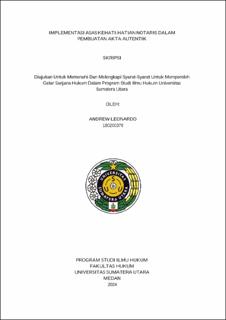| dc.description.abstract | A notary is a public official who is given the authority to make authentic deeds. In carrying out their authority, notaries often encounter problems both in court and outside of court regarding the deeds they make. So notaries are required to be more careful in carrying out their duties and authority. So the problem is formulated as follows: How is the Notary's precautionary principle implemented in the implementation of making authentic deeds? What are the principles of notary caution in the process of making authentic deeds? and What are the legal consequences for the exercise of authority by a notary who does not implement the precautionary principle?
Using empirical research methods, this research will examine situations that have occurred and been directly experienced by notaries. From the research results, it is clear that the notary applies the principle of caution by checking the authenticity of the data and documents that exist when the notary's client or notary faces them. Apart from that, placing fingerprints on the minutes is also a step for the notary in signing and a form of careful action in carrying out the deed. Apart from that, in carrying out their duties, the notary must always check the deed that is made, the first check is carried out by the staff who made it, then the notary will correct other redactions and the contents of the deed. The next step is that the notary reads the deed directly in front of the audience so that the audience understands the contents of the deed and is open to each other about the intent and purpose of making an agreement using the deed. In the current digital era, some notaries have also added photos as attachments to the minutes that they have carried out the transaction as they should. So that it can be supporting evidence if problems occur later.
The application of the precautionary principle for a Notary is very important, because if a Notary in carrying out his duties and position does not heed the precautionary principle which results in violating existing legal regulations, this can cause losses both for the parties related to the deed, as well as for Notary himself. | en_US |


